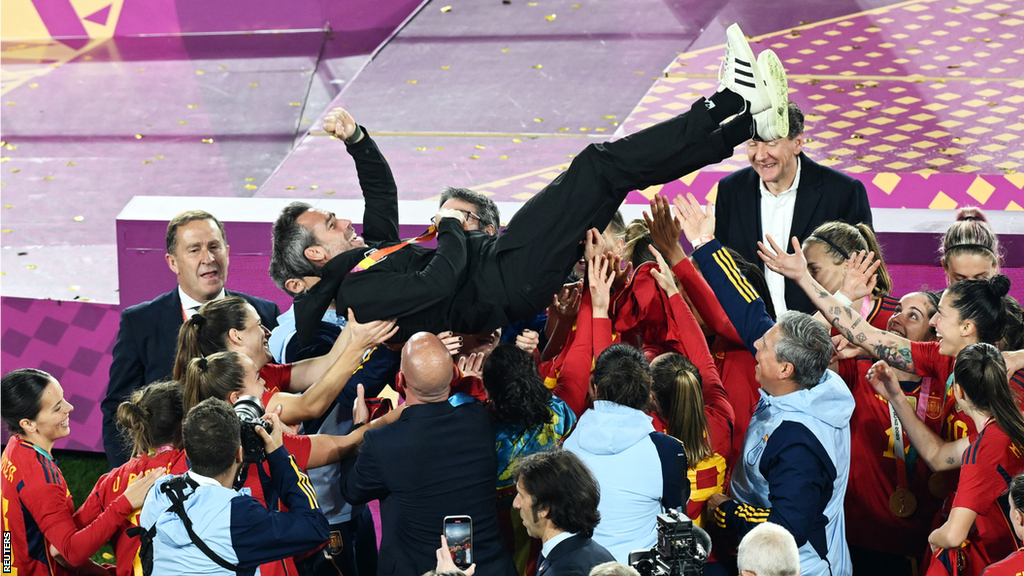Women's World Cup 2023: Jorge Vilda says Spain players are 'eternal' after they beat England
- Published
Women's World Cup 2023: Spain defeat England to win the Women's World Cup 2023
Even in glorious triumph, sounds of disapproval rang out in Jorge Vilda's direction.
As his players celebrated winning the World Cup for the first time after defeating England 1-0, boos rang out in the crowd when the jubilant Spain boss was pictured on the big screen being congratulated by Spain's Queen Letizia at Stadium Australia.
Moments earlier, Vilda had looked up to the sky, raised his hands and screamed with joy when the referee ended the match to confirm Spain as world champions.
Controversy has followed Vilda at every turn of this tournament and even in victory there was no escape.
This will go down as one of the most remarkable triumphs in Women's World Cup history, with Spain entering the tournament amid a backdrop of unrest and a number of players unhappy with Vilda, who had survived a player revolt to keep his job.
The Spanish football federation (RFEF) released a statement revealing that 15 players had submitted identical emails saying they would not play for Vilda unless "significant" concerns over their "emotional state" and "health" were addressed.
"Las 15", as the players became known, denied claims they had asked for 42-year-old Vilda to be sacked, but tension followed amid reports of concern over training methods and inadequate game preparation.
Yet in Australia and New Zealand, his players put aside their differences to conquer the world in an impressive style at just their third World Cup, prompting Spain's official Twitter account to post: 'VILDA IN, external'.
"The girls are eternal now and they have a star on their chest forever," said Vilda. "It's been very easy [to manage the group].
"We are a family, we are world champions with a family of players."
Women's World Cup 2023: Carmona scores the World Cup winner for Spain
'Just ridiculous'
Spain were made to wait before they could finally celebrate. After 13 minutes of stoppage time were signalled at the end of 90 minutes, it was not until the 105th minute that the referee brought the final to an end.
Some of Spain's players were in disbelief as the magnitude of their achievement started to sink in. Others were in tears.
Spain came into the tournament missing some of their best talent due to the player revolt, including several members from Barcelona's triumphant Champions League campaign like Mapi Leon, Patri Guijarro and Sandra Panos.
Three of the 15 selected were recalled after having been frozen out of the national set-up after a protest, including midfielder Aitana Bonmati and defender Ona Batlle, who both started all seven games in Australia and New Zealand.
When they lost 4-0 to Japan in their final group game, they looked a long way from being world beaters.
"No-one should lose hope," said Vilda after that defeat in Wellington on 31 July.
"We have not seen the best Spanish team yet. This defeat hurts, the players are angry and I am convinced they will be better."
After his side's World Cup victory, Vilda described the Japan defeat as a "turning point", adding: "It made us react, the team changed and the players increased their contributions. Mentally they were much stronger.
"I believe these reasons helped us reach the final and won the final."
Indeed, Spain bounced back from that setback to defeat Switzerland, the Netherlands and Sweden to make the final.
Against European champions England, La Roja produced a tactical masterclass. Even after captain Olga Carmona's winner, they enjoyed more possession and attempts on target.
"For me, it's credit to those players," former England striker Ellen White told BBC One. "To win a World Cup is just absolutely phenomenal.
"It takes a lot of guts, mentality, desire, hard work, togetherness. The way this Spanish team played today was just unbelievable.
"The way they moved the ball was just ridiculous."

Spain are the fifth team to win the Fifa Women's World Cup after the USA (4), Germany (2), Norway and Japan
'Progress has been phenomenal'
Seventeen of the 23-player squad were appearing at their first World Cup including keeper Cata Coll and 19-year-old forward Salma Paralluelo.
Despite the controversy that followed him around, Vilda was not afraid to make bold decisions.
After the defeat by Japan, he gave a senior debut to Coll, while Paralluelo came off the bench to score in back-to-back games as Spain performed admirably throughout the knockout stages before deservedly overcoming England.
Spain's players performed on the pitch despite all of the noise off it.
Before the semi-final win over Sweden, long-serving forward Jenni Hermoso spoke emotionally of the progress made in the women's game since she made her senior international debut in 2012 when she used to play in front of crowds of a few hundred.
On Sunday, she celebrated winning the World Cup in front of 75,000 in Sydney.
Spain now have women's world titles at senior, under-17 and under-20 levels.
"This Spanish side, this nation, what they have achieved in women's football over the last two years is phenomenal," added White.
Women's World Cup: England fans in tears as Spain's supporters ecstatic
'This is unstoppable'
Vilda, who has been in charge since 2015, was asked afterwards whether he would pursue other job opportunities after masterminding Spain's World Cup success.
His contract with the national team is due to expire in 2024.
"Right now we are going to celebrate," said Vilda. "We are going back to Spain to see our loved ones and we will see."
Meanwhile, Carmona hailed her "unstoppable" side.
"We have suffered a lot over the past 12 months. This has made us a stronger team," she said."We had the feeling we were going to do it; this is unstoppable."
The Spanish FA revealed that Carmona sadly found out after the match that her father had died.